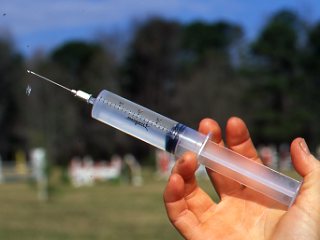Over the past 75 years, vaccines have saved the lives of thousands of horses and rendered a number of terrible equine diseases exceedingly rare. They remain among the most effective weapons for protecting horses against the ravages of disease.

How Vaccines Protect
Vaccinations work by introducing weakened or killed microorganisms into the body to train the immune system to destroy specific disease-causing agents. In the vast majority of cases, this process results in long-lasting immunity.
Occasionally, vaccination causes local swelling or soreness. Rarely, a horse may suffer an allergic response that is itself a threat to his health.
Most equine vaccines are administered via intramuscular injection, which delivers the preparation into muscle tissue, where it is selectively taken up by the body and processed.
Intranasal vaccines,which are delivered via a spray into the nostrils, are also available for horses. Because these vaccines induce a strong immune response in the respiratory tract, they are used for influenza and strangles,which attack the body there.
Intravenous vaccines,which are delivered straight into the bloodstream, are available for people, but currently none are manufactured for equine use.
What Your Horse Needs
Not every horse needs to be vaccinated for every disease. Your veterinarian is your best resource for evaluating your horse’s circumstances. As you discuss what’s appropriate for your horse, consider four variables that influence his risk of disease:
Age. Very young horses are at the greatest risk once the immunity they acquire from their dams begins to wane. Elderly horses, too, may have a compromised immune response.
Occupation. The more demanding a career, the greater the physical stress,whether a horse is an elite athlete or a broodmare. In addition, horses who routinely travel–to shows, events or for breeding–are likely to encounter more potential pathogens than those who rarely or never leave home.
Housing arrangements. A solitary horse who seldom journeys any distance from the farm is at far less risk of disease than the residents of a large boarding stable with lots of incoming and outgoing equine traffic.
Location in the country. Certain diseases that affect horses are prevalent in particular areas.
Whatever vaccination regimen you and your veterinarian choose, periodically reevaluate and adjust it based on new threats, changes in local/regional conditions and any modifications that have occurred in your horse’s lifestyle.
The Roster of Diseases
The American Association of Equine Practitioners recommends vaccination, when appropriate, against the following diseases that affect horses. (They are listed below alphabetically and not in order of priority).
Botulism: food poisoning caused by the toxin secreted by Clostridium botulinum bacteria,which can contaminate feed and water. The condition is characterized by paralysis, beginning with the muscles of swallowing, and it is usually fatal.
Equine viral arteritis: a respiratory and venereal disease that can cause abortion.
Equine viral encephalomyelitis: brain and spinal-cord inflammation caused by several species of alphaviruses in the Togaviridae family that are usually transmitted bymosquitoes. The disease is characterized by fever, erratic behavior and/or stupor and is almost always fatal. Eastern equine encephalomyelitis (EEE) and Western equine encephalomyelitis (WEE) are present in North America; Venezuelan equine encephalomyelitis (VEE) has not occurred in the United States for decades but outbreaks still occur in South America.
Influenza: an acute viral infection involving the respiratory tract. Signs of influenza include inflammation of the nasal mucosa, the pharynx, the conjunctiva, the lungs and sometimes the heart muscle.
Potomac horse fever (monocytic ehrlichiosis): a disease caused by a rickettsial organism, Ehrlichia risticii. Named after the Potomac River Valley where it was first recognized in 1979, the disease is characterized by fever, diarrhea and laminitis0.
Rabies: a fatal viral disease of the central nervous system. There is a long incubation period, and signs of rabies usually develop over many days.
Rhinopneumonitis: a highly contagious disease caused by herpesviruses (EHV-1, EHV-4). Rhinopneumonitis is characterized by fever, mild respiratory infection and, in mares, abortion. In rare cases, some strains of these herpesviruses also cause potentially fatal neurological complications.
Rotavirus A: a type of virus that causes profuse diarrhea in foals younger that 3 months of age. In addition to diarrhea, signs of rotavirus A infection include failure to nurse, depression and difficulty/inability to stand.
Strangles (distemper): a highly contagious infection of the lymph nodes, usually of the throat, caused by Streptococcus equi bacteria. The abscesses may become so large as to obstruct the airway (hence the term “strangles”) and may break internally, draining a thick, yellow pus through the nose, or externally, draining through a spontaneous or surgical opening in the skin.
Tetanus: a rigid paralytic disease caused by the toxin of Clostridium tetani, an anaerobic bacterium that lives in soil and feces but that also can infect wounds.
West Nile virus: a flavivirus transmitted by mosquitoes. West Nile virus can infect birds, horses, people and other mammals. In horses, as in people, infection usually causes little or no illness. However, for reasons not yet determined, West Nile infection sometimes triggers swelling of the brain (encephalitis) that produces limb weakness, muscle twitching (fasciculation), incoordination, behavioral changes, paralysis and recumbency. In severe cases,West Nile encephalitis can lead to coma and death.
Two Sample Vaccination Schedules: Pleasure Horse & Performance Horse
The American Association of Equine Practitioners (AAEP) has produced a suggested vaccination schedule for horses of varying ages and activity levels–foals/weanlings, yearlings, pleasure horses, performance horses and broodmares. Here are the guidelines for pleasure and performance horses; for the others, go to www.aaep.org. The AAEP recommends that you consult with your veterinarian regarding the specific needs of your horse.






